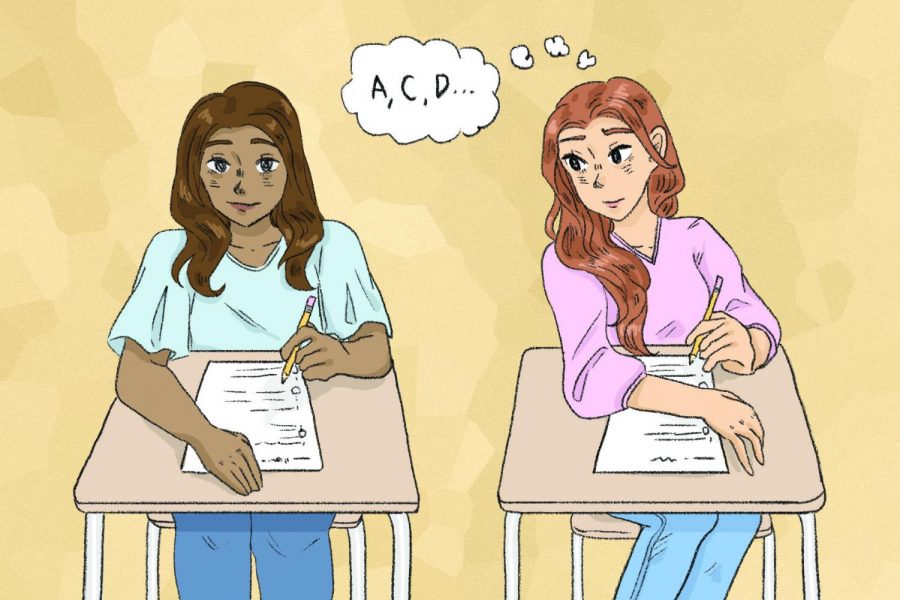Column: Cheating nullifies opportunity
Rigorous standards do not justify academic dishonesty
Cheating on tests or homework is something many students see on a day-to-day basis. The Sidekick staff writer Sreeja Mudumby thinks cheating should not be tolerated, as it takes away the value of achievements and gives a bad image to students and the school they represent.
February 28, 2020
“What are the answers for the test?”
The thought of getting a 30 on the exam is unsettling. As the timer is going down, the temptation of peering over at a neighbor’s paper overcomes one’s morals of academic honesty.
I have seen this happen way too many times, and I have done nothing about it.
There are many loopholes in today’s testing environments that students can take advantage of. Putting slips in mechanical pencils, writing small notes on their hands and simply peering over at their neighbor’s paper are all common actions in schools.
Cheating has become a widespread problem in schools, and though the consequences may seem daunting, many students get away with it and sweep up a grade much higher than they deserve.
Students who cheat their way into getting a good grade often demean others for getting a low grade without cheating. This has happened to me and has made my self-esteem plummet down when it shouldn’t.
In what way is this justifiable?
Students often justify their academic dishonesty with the reason of stress. The load of homework received every night, along with extracurriculars and loss of sleep all contribute to surrendering to academic dishonesty. Some lessons in the school are complex and take a while to comprehend. What else are they supposed to do besides cheating to keep their GPA high?
Those are all excuses. In today’s technology-filled environment, we have the entire world within our fingertips. Why can we not use this to our advantage? YouTube videos and step-by-step instructions are all readily available. Teachers also often offer tutoring sessions to provide extra help for the students.
“Sometimes I am [tempted]. Some of the stuff we learn is hard,” Coppell High School sophomore Rosanna Jess said. “To stop [myself], I’m just like ‘in the future, if I can’t cheat, what’s the point of cheating now?’”
The consequences of cheating dive deeper than the basics. When someone decides to break the rules and cheat, they are not only making a bad name for themselves, but for the school as a whole. They also develop bad habits that could negatively affect them in the future.
“An employer doesn’t want to hire somebody that would choose to do something dishonest,” CHS computer programming teacher Joe Musgrave said.
The entire issue of cheating circles around chance. A student could either get away with it, or face dreadful consequences. Some teachers let students get away with it, either because they do not have the specific proof, or they let it go with a warning. Regardless, the entire situation is unfair, and could be avoided if students possessed academic honesty.
It is saddening to think we have stooped so low to where cheating has become a mere joke to students. We forget the basic morals we live by and the standards we set for ourselves.
Often times students, and people in general, forget the fact that life is a journey of learning, and the destination is different for everyone.
Follow @sreejamudumby and @CHSCampusNews on Twitter












Nainika • Feb 28, 2020 at 5:58 pm
Sreeja I totally agree with this because it is becoming a major issue in many school. Cheating something that shouldn’t be encouraged in our world. Good job!
Victoria Hertel • Feb 28, 2020 at 12:27 pm
Sreeja I agree with your story, cheating is a huge problem among those who would seem to be the smartest people. Also, your graphic is beautiful Kaylee!
Akhila Gunturu • Feb 28, 2020 at 12:27 pm
I know you worked really hard on this column and it turned out great! This is such a big problem and I can really relate to the concerns you talked about, nice job